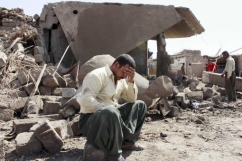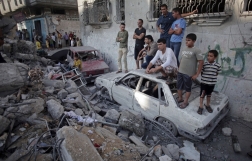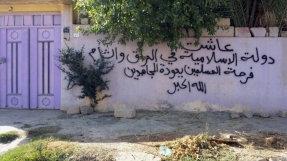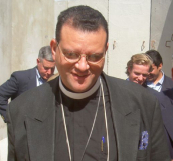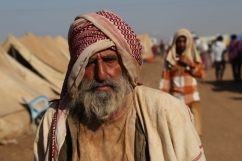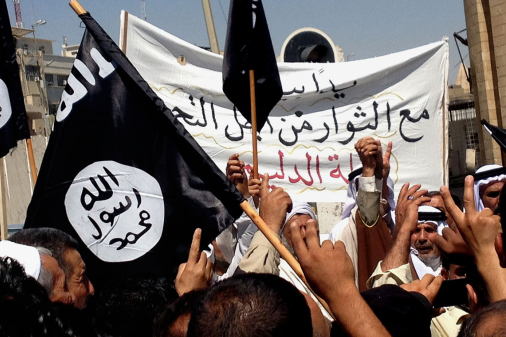
Our newspapers, TV screens and social media timelines are filled with horrific images of the Iraqi crisis. From Christian families shot through the head for their faith, to Yazidi parents being forced to leave their dead children on a mountainside, the sheer weight of evil has become overwhelming.
The Islamic State (IS) is continuing its reign of terror across Iraq and Syria – tightening its grip on an ever fractured nation and our natural response is one of hatred. We rile at the hideous persecution of our Christian brothers and sisters along with other religious minorities, and rightly so. We must undoubtedly stand against the militants, fight for the rights of marginalised communities and condemn the atrocities so regularly committed against them.
And yet, if we do so out of hatred, are we not guilty of directly contradicting Jesus' command to love our enemies, and bless those who persecute us?
"Blessed are those who are persecuted because of righteousness, for theirs is the kingdom of heaven," Jesus declared in the Sermon on the Mount. But he later also added:
"You have heard that it was said, 'Love your neighbour and hate your enemy.' But I tell you, love your enemies and pray for those who persecute you, that you may be children of your Father in heaven."
But how do we respond to Jesus' radical call to love our enemies in the midst of a broken world, during a time when our 'enemies' have never been quite as visible as they are now?
Is it even appropriate to ask people to pray for perpetrators of evil, when there are countless innocent people suffering under their oppression? Christian Today knows of at least one Christian agency in which prayers for the persecutors were omitted from a final draft of a prayer resource, because it was deemed too controversial. But why is this?
"I think that the western evangelical mindset and understanding of how the world works predisposes us to a problem, in that we have somewhat of a discomfort about suffering as well as those who inflict it," says Steve Bell, national director of Interserve.
"We see it as 'more Christian' to be the Good Samaritan and pick up the pieces rather than praying for the people who attacked in the first place. Traditionally and historically, we're not equipped as the Church – we don't know what to do about the bad guys."
Bell believes that prayer in times of crisis has become "too messy for our theology" and we need a "deeper understanding of God's purpose in human history."
He argues that we should be actively praying for the repentance and "Damascus Road experience" of those committing evil acts, rather than abstractly condemning them. "We should be praying and going after the worst of them in prayer," he urges, explaining that we need to balance our response with "grace and truth".
"John 1 says that the law came by Moses, and grace and truth came through Jesus Christ. Grace for the attitude, and truth for standing up for what's right.
"It's that change that has to happen before we can do anything – before we can listen to the news with a better balance, let alone pray. The first thing to cross is the attitudinal hurdle – a grace and truth response opens us up to a more balanced approach to praying about evil."
As for loving our enemy, Bell says it's important to separate the individual from the dark forces that provoke them to engage in the acts they are committing.
"I found a helpful definition recently which says loving another person is working for the very best for another, and being prepared to do the very best for the other. I think my reading of 'love your enemy' release them from the ideology that motivates them...and because you love them, hating with a perfect hatred the thing that motivates them and the things they do."
That being said, perhaps we should examine our own hearts, and look at the way we approach the Iraqi crisis in prayer. What could happen if we put loving our enemies into practice? If we saw lives being torn apart by evil and responded with love, rather than hate?
Here are three practical suggestions of how to pray for ISIS:
1. If you want to pray that they would all perish, instead try praying for justice.
It's so easy to wish that every militant would be killed, leaving the Iraqi people free to rebuild their lives. But rather than pray for their deaths, perhaps instead ask for God's will and justice to be done, trusting that his understanding is greater than ours.
2. If your instinct is to pray for military success, pray instead for peace.
Pope Francis himself has suggested that military action against IS could be justified, but rather than focusing our prayer on further violence, petition instead for peace, reconciliation and stability.
3. Rather than only praying for Christians to be saved, pray also that members of IS would turn to God.
How incredible it would be for radical Muslims to see the witness of the Iraqi Church, the testimony of persecuted Christians and encounter the living person of Jesus. Nothing is impossible.










